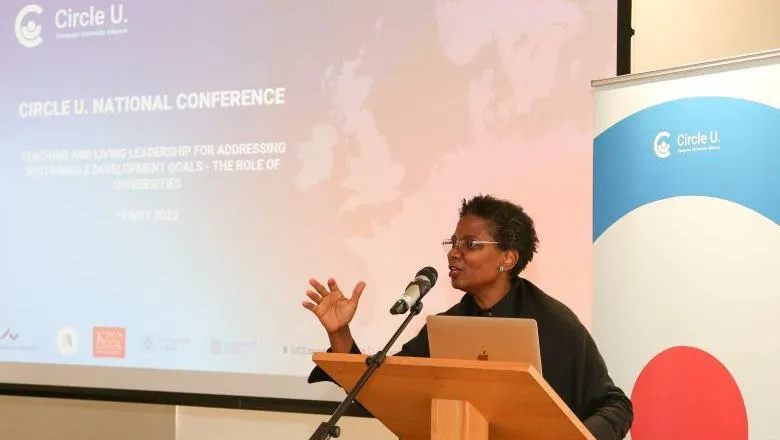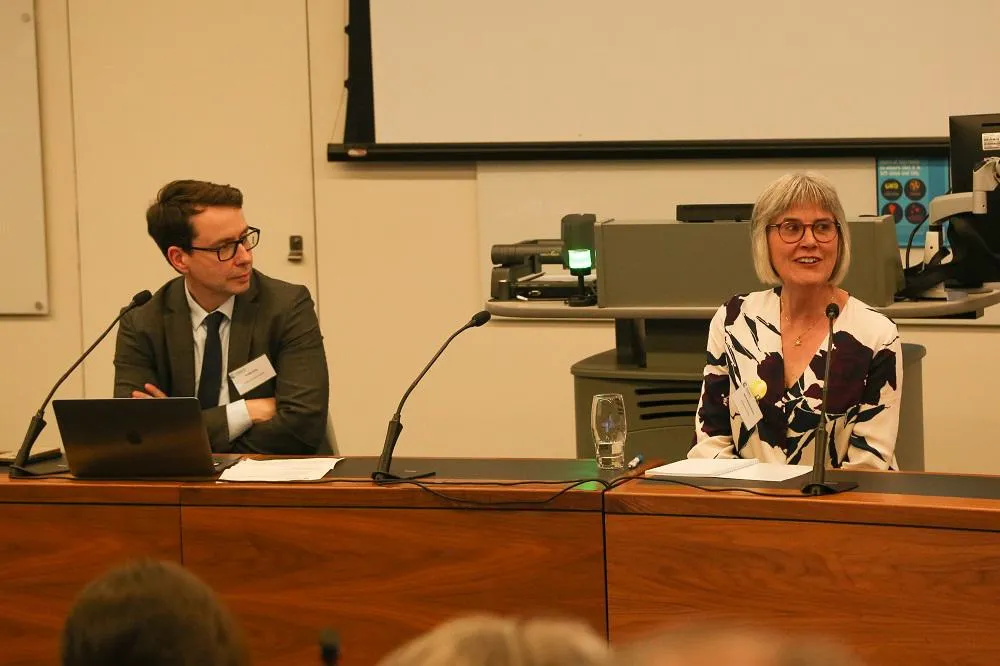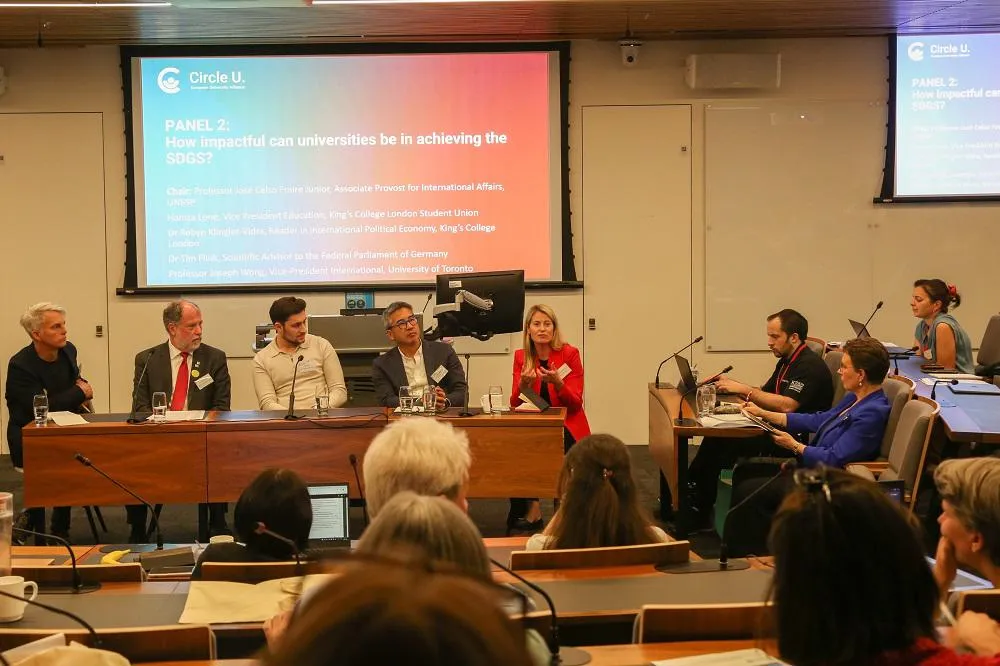King's College London hosted the first Circle U. National Conference, 'Teaching and living leadership for addressing Sustainable Development Goals - the role of universities'.

On 19 and 20 May 2022, King's College London hosted the first Circle U. National Conference, 'Teaching and living leadership for addressing Sustainable Development Goals – the role of universities'.
The conference brought together Circle U. member universities, partner universities, embassy representatives and higher education stakeholders from the UK and beyond, to discuss and reaffirm the fundamental role that universities play in delivering the United Nation's Sustainable Development Goals (SDGs).
Professor 'Funmi Olonisakin, Vice President (Global Engagement) at King's, opened the conference by underlining the vision and mission of the Circle U. Alliance "to be an inclusive, research intensive and interdisciplinary European University" where "students, staff and partners from civil society, businesses and the public sector collaborate jointly to develop competencies and solutions for keeping Europe and our planet healthy, peaceful, democratic and prosperous" and the relevance of the conference in this context.
The relationship with the SDGs is unmistakable. But what is this deliberate focus on leadership at this conference? It is intended to help us interrogate this identity deeply, and our commitment as Circle U., both as a European University Alliance and as a whole to make commitments to such global visions that help us forge a path to fulfilling the promise articulated by our vision.– Professor 'Funmi Olonisakin, Vice President (Global Engagement), King's College London
In his keynote speech, Robert Skinner, Deputy Director and Chief of Partnerships and Global Engagement in the United Nations Department of Global Communications, emphasised the importance of universities as "fundamental collaborators and partners in fostering the SDGs." He also shared insights about the UN's SDGs in Academia series, which highlights the activities of United Nations Academic Impact (UNAI) members in connection with the UN's 2030 Agenda for Sustainable Development.
The UN general assembly recognised when it adopted the 2030 Agenda that governments alone could not achieve the SDGs. All sectors of society need to be part of the solutions, including and especially the academic community. The key words for us in the 2030 Agenda are solutions and implementation, and for universities, this means you are not passive actors, but fundamental collaborators and partners in fostering the SDGs.– Robert Skinner, Deputy Director and Chief of Partnerships and Global Engagement, Outreach Division, United Nations Department of Global Communications
Chaired by Professor Bobby Duffy (Director of the Policy Institute at King's) the first panel discussed 'Leadership and Democratic Societies', and how this topic relates to the role of universities in achieving the SDGs. Professor Duffy was joined by Professor Tshilidzi Marwala (Vice-Chancellor of University of Johannesburg), Professor Mette Halskov Hansen (Vice-Rector for Climate & the Environment and Cross-Disciplinarity at University of Oslo) and Professor Sandra R. G. Almeida (President of Universidade Federal de Minas Gerais), for a discussion which included the importance of knowledge to leadership, the need for universities to set an example of democratic leadership which engages and includes all those within their organisations, and the need to consider their connection to society in a changing world.
Learning, knowledge and leadership are an essential mix, and those who do not know cannot lead.– Professor Tshilidzi Marwala, Vice-Chancellor, University of Johannesburg

For the second panel, Professor José Celso Freire Junior (Associate Provost for International Affairs at UNESP) was joined by Hamza Lone (Vice President Education at KCLSU, 2021-22), Dr Robyn Klingler-Vidra (Reader in International Political Economy at King's), Dr Tim Flink (Scientific Advisor to the Federal Parliament of Germany) and Professor Joseph Wong (Vice-President International at University of Toronto) for a discussion entitled 'How impactful can universities be in achieving the SDGs?'
The panel considered a range of topics, including the role universities have in serving society and educating leaders, the importance of involving and empowering students in the co-creation of solutions, the importance of including affected communities in measuring the impact of activities designed to address the SDGs, the dichotomy between competition in research and collaboration to address the SDGs, and the importance of reciprocal, equitable and relevant partnerships between the Global North and the Global South.
When we talk about the student perspective, I think that's what's really important for us; really being involved in those conversations, not just for the future's sake, but for today, where we have that drive, we have that passion, to get involved in these conversations.– Hamza Lone, Vice President Education (Arts & Sciences), KCLSU, 2021-22

Day two of the conference brought together attendees from King's and across the Circle U. Alliance for three interactive workshops on Creativity and Culture, Education and Sustainability, and Global Health in the Curriculum. All three workshops considered how these topics can be embedded within and across our curriculums and institutions.
Watch the panels
Click here to watch a recording of the panels from the Circle U. Conference 2022.
Circle U.
Circle U. is led by the University of Oslo (Norway) and includes eight other European Universities who share a commitment to developing knowledge in service to society: King's College London (UK); Aarhus University (Denmark); Humboldt University (Germany); UCLouvain (Belgium); University of Belgrade (Serbia), University of Paris (France), University of Pisa (Italy) and University of Vienna (Austria).
Circle U. aims to create an inclusive, research-intensive, and interdisciplinary European University which provides a multi-cultural and multi-lingual student experience.






